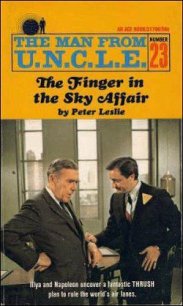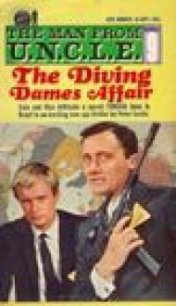The Splintered Sunglasses Affair - Leslie Peter (книги регистрация онлайн бесплатно txt) 📗
And the question of Solo's metier was not raised again until the following day. They had coffee and brandy and talked about the harnessing of the tides for the provision of electricity. Then they went to bed and in the morning Solo and the girl went twice around an 18-hole pitch-and-putt course laid out in the grounds. Carlsen did not appear until lunchtime, but they were never out of sight of one or more of the armed guards, Solo noticed.
During the meal—pesto followed by a chicken souffle—they talked of automation and the need to educate people to use the extra leisure it would bring. Carlsen had sent away the light Chianti with which they had washed down the pasta and its fragrant green sauce, and was busy opening a bottle of Corton Charlemagne. "Oddly enough," he said with a sidelong glance at Solo, "that brings me back to Thrush. My agents tell me that they work from what they call the Ultimate Computer. Have you ever heard of that?"
"I have heard the phrase used," Solo said guardedly. "Apparently it's the computer to end all computers.... One hears that it directs every major operation they handle. They feed in all the relevant data, and the computer comes up with the required plan of action."
"Really?"
"Right down to the smallest detail, they say—including the particular operatives to be briefed and the exact course of action each must follow!"
"In view of their record of successes over the past few years, one can only suggest that such a computer, if it existed, should be re-programmed," Solo said drily.
Lala Eriksson laughed. "You can hardly expect a computer—even if it's ultimate!—to take into account the vagaries of people like you!" she said.
And later, after Carlsen had excused himself on the plea that he had work to do in his study, and they were sitting on chintz-covered chairs over coffee in the drawing room, she came back to the subject. "Leaving aside the efficiency of the plans it makes," she said, "don't you think the use of a highly sophisticated computer like that would in fact delay an operation, once you had operatives in the field reporting in?"
"I don't quite see why," Solo said.
"Well, because any reasonable plan would have to be constantly amended—every report from the field would materially alter the overall situation, and would have to be taken into account before the next stage of the plan was evolved."
"So?"
"So although a computer decides quickly, in a fraction of a second, I imagine the time taken to prepare it for that decision—making ready the data cards, programming, feeding in, and so on—could easily negate the advantage given by its operating time. After all, top men can decide quickly, too. That's why they are top men. And all they have to deal with is a telephone call, or a written message, or something equally immediate."
"Possibly."
"In other words," the girl said, "I'm not at all sure that they wouldn't be better off using the old fashioned human-error methods—at least as far as the time element goes."
Solo decided to hold out a carrot. "You're leaving out the quality of the relative plans, the computer and the human," he said. "But in any case, we live in a technical age, don't forget. It's not always simply a case of an agent telephoning in, is it?"
She took him up on it immediately. "You mean the more sophisticated methods of communication—microdot pictures, codes, scrambled radio messages, holograms, unusual frequencies used on broadcasts to activate the keys of telex machines—all these would take just as much time as programming a computer?"
"Exactly."
"Yes... I suppose a big organization like these Thrush people would simply have to keep abreast of the latest developments to stay in business, wouldn't they?"
"Would they?"
"Of course they would! But you know—what do they use in the way of communication? Clandestine communication, I mean. What do you use, Mr. Solo?"
"I send my headquarters a postcard," Solo said.
Lala Eriksson laughed. "You probably do, at that!" she said. "Will you have another cup of coffee?"
And later in his own room, after they had walked around the flower gardens and he had pretended he had a headache as a means of gaining solitude, Solo went over the conversation—and the others they had had—very carefully in his own mind. It was puzzling enough to have been kidnapped between assignments and taken to some country retreat apparently far from New York; it was doubly surprising, after this coup, to find himself a very free prisoner being wined and dined and indulged in intellectual conversation. But the most astonishing thing of all was the reaction of his hosts at his response, or lack of it, to the occasional loaded question they carefully introduced into all this good living! They had said they wanted to talk to him... that was all. And indeed this seemed up to a point to be true. And the subject, disguise it as they would, was obviously enough something to do with communications, either Thrush's or those of U.N.C.L.E. And yet each time Solo blocked or ignored the question—as he invariably did—they dropped the subject with perfect good humor and never returned to it! This seemed to him an odd reaction for people who had gone to such immense pains to abduct him....
In fact, so far as he could see, there was only one explanation which fitted all the disparate aspects of the case. And if he was right... then he was in big trouble! First, though, he would have to check; he would float out a decoy during dinner, and see if it was taken.
His opportunity came half way through the meal. Faute de Grives, Quenelles de Brocket and roast duck had all gone their splendid way, and Carlsen had adroitly—oh, very adroitly!—led the conversation from the population explosion, through the coming world food shortage and modern dietetics, to famine and natural catastrophe generally. And from there it was an easy step to measures designed to combat such things... and thus again to communications.
Solo smiled inwardly. "In such universal cases," he said, "I mean where there's no question of wrongdoing or people on the run, I see nothing wrong with the good old systems of telephone, cable or radio."
"Oh, but my dear fellow, just think!" Carlsen said. "What about an outbreak of bubonic plague, lethal fallout, the news that a country's water supply had become contaminated, anything that could cause panic? Surely news of such things must be transmitted in some form which hides its meaning from the casual eye? Otherwise a single unauthorized look could lead to riots!"
"As you were saying yesterday, there are codes, photographic—"
"No," Carlsen interrupted, "but suppose you had discovered that, for the sake of example, an unknown virus was threatening the year's rice crop in India, and that a neighboring country was going to exploit this. You'd want to give all the details to UNRWA or some other United Nations agency... you'd have to let them have all the data and decide for themselves if your theory was correct. And yet nobody must see your dispatches in case you were wrong—or in case it caused panic."
"Yes, well—the first thing to do would be—"
"You'd have to send graphs, tables, photographs of the affected plants, all sorts of things in addition to your written report. How would you do it?"
"I see what you mean," Lala Eriksson said. "Pictures by radio or by wire can be intercepted; photographs, even microdot ones, can be developed; documents can be photostated. If there were other people equally interested in seeing your report—and you wished to prevent them—what would you do?" She looked at Solo.




